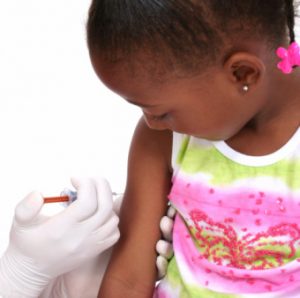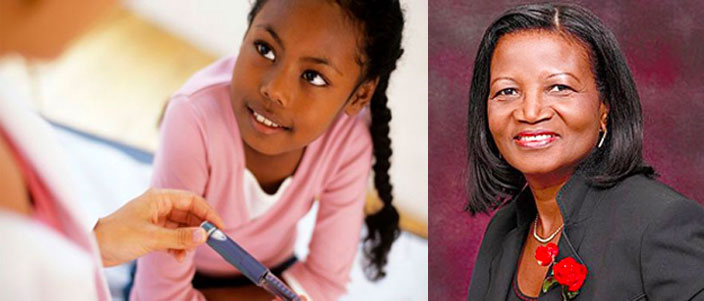While Trinidad and Tobago and the wider Caribbean are certainly not immune to the rising global tide of obesity and diabetes in children, the region lacks one key determining factor that could alleviate the situation: comprehensive research and data.
It is the culmination of Yvonne Batson’s life’s work to bridge this knowledge gap, through her PhD entitled: ‘The Prevalence of Type 2 diabetes in children and adolescents in Trinidad’.
Cultural factors affecting this disease will differ greatly“It was not novel in the sense of a new idea, but no one had ever conducted this kind of research locally,” she explains. “In so many areas of health statistics, we have been using U.S. data, which does not truly reflect our situation — particularly when it comes to obesity and diabetes, as the cultural factors affecting this disease will differ greatly.”
Yvonne Batson is an associate lecturer and PhD candidate at the University of the West Indies, St. Augustine campus. A registered dietitian and nutritionist, she also operates a private practice out of Good Health Medical Centre in Woodbrook, North West Trinidad.
She holds a BSc in Nutrition and Dietetics from the University of Aberdeen in Scotland; an MSc in Human Nutrition from the School of Hygiene and Tropical Medicine in London, England; and an MPhil in Community Nutrition from the University of the West Indies in Trinidad and Tobago.
She is a certified Nutrition Injury Specialist with the department for Veterans Affairs in the U.S.A., and she is also the Caribbean Association of Nutritionists and Dietitians’ national representative for the International Confederation of Dietetic Associations. She is the author of several published papers on diabetes and nutrition.
The field of Nutrition & Dietetics
Ms. Batson has always had a passion for health and wellness, with a particular interest in the integration between nutrition and fitness.
She chose to study Nutrition and Dietetics, which she specifies are not interchangeable fields as many may mistakenly believe.
Dietitians, specifically, are hospital-oriented“Dietitians, specifically, are hospital-oriented — it is not the same with nutritionists,” she clarifies. “Just as in the medical field, as a dietitian you are treating ill people, so you need to have that clinical training to prepare for working in the field.”
Only a registered dietitian is allowed by law to use the term, and the holder of the title is accountable to the respective regulatory body for his/her professional conduct and the care provided. Furthermore, whereas dietitians are considered to be nutritionists, not all nutritionists are dietitians. Some healthcare providers may also be nutritionists if they have completed additional study in the area, such as medical doctors, osteopaths, physicians, and chiropractors.

When Ms. Batson returned to Trinidad after having spent 11 years abroad, she began working as a dietitian in the hospitals, and also branched into nutrition. She partnered with the Trinidad and Tobago Regiment and the Coast Guard, where she gave guidance on nutrition for the Physical Training Instructors (PTIs). It was an opportunity she cherished, as she was able to merge her passions for nutrition and fitness.
Meanwhile, she continued to build upon her knowledge through her MPhil in Community Nutrition, alongside many other shorter courses and conferences she attended.
Nutrition is a changing field“Nutrition is a changing fiel, and you have to keep up to date,” she notes. “In particular, my focus was on children — I was becoming more and more concerned with the rising level of obesity in schools. That is really the area we have to look at if we hope to change anything for the future.”
Diabetes in Schoolchildren
Her opening came about five years ago, when she became the first recipient of funding from the Diabetes Education Research and Prevention Institute (DERPI), the trust established by Mrs. Helen Bhagwansingh, one of the most successful businesswomen in the country and a household name in the Hardware and Steel industry.
Ms. Batson’s research entailed a cross-sectional survey performed among 67,000 school children aged 5-17 years in Trinidad during 2009 to test for urine glucose, 56.3% of the school-aged population of 125,000.

“Type 1 diabetes is most common among children,” explains Ms. Batson. “These children are born with diabetes in their genes. Type 2 is more commonly found in adults, as it comes on over the years due to their lifestyle choices. However, the research has proven that more young children have diabetes or will be likely to get diabetes.”
More young children have diabetes or will be likely to get diabetesMs. Batson and her team, led by Professor Surujpal Teelucksingh, considered the sensitive aspects of performing tests on children, and did their best to work around these constraints.
“Firstly, we chose urine as we did not want to harm or traumatise a mass amount of children through taking blood,” Ms. Batson says. “They collected it at home and brought it in. If the child tested positive, the next step was to come to the hospital to do a glucose tolerance test. As children may have difficulties fasting for the necessary period before the test, we arranged with Mt. Hope Hospital to take them early in the morning — that way, they would just have to have an early dinner and not really miss any meals.”
It was the first study of this nature and magnitude to be conducted in Trinidad and Tobago and the CaribbeanOf the test sample of 67,000, 23 children were found to have persistent glycosuria (the excretion of glucose into the urine) and 21 agreed to undergo an oral glucose tolerance test. Eight fulfilled the American Diabetes Association’s criteria for diabetes and five for pre-diabetes.
It was the first study of this nature and magnitude to be conducted in Trinidad and Tobago and the Caribbean, and was particularly significant as the prevention of diabetes in childhood is likely to be more cost effective than treating complications that accrue from undiagnosed or under-treated disease.
Furthermore, the results of this research signalled undiagnosed type 2 diabetes in the family, and DERPI proposed to intervene on all family members in the household, who were willing to participate in a family-oriented, school/community-based intervention.
Changing the public mindset

Although she has been ‘winding down’ her private practice as she focuses more on her research, Ms. Batson maintains that she enjoys working with people, and feels as though she has made a difference in the lives of her clients.
“The best part of it, of course, is when you see those who come back and they have listened, made the changes they needed to and seen success — they have made a commitment to themselves to change for the better,” she says.
“On the other hand, sometimes the person will know exactly what to do but just does not do it. I have had clients who simply don’t remember to take their insulin before breakfast, particularly if they are busy or working several jobs to make ends meet. I have to work out a plan that fits the particular person — around each individual lifestyle, and work on building positive habits and lifestyle changes.”
Once someone can change their mindset, they can change their lifeShe points out that she does not blame the client, but simply tries to troubleshoot and change tactics — for example, incorporating more exercise for a diabetic patient might counteract some poor nutritional choices.
“It is not just a nutritional consultation,” she adds. “Food, nutrition and lifestyle choices revolve around psychological and social aspects. Once someone can change their mindset, they can change their life.”

